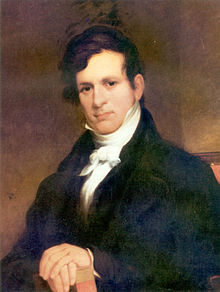
Back جون إيتون Arabic جون ايتون ARZ جان ایتون AZB Джон Ітан Byelorussian John Henry Eaton German John Eaton Spanish جان ایتون Persian John Eaton (homme politique) French ג'ון איטון HE John Eaton Hungarian
John Eaton | |
|---|---|
 | |
| United States Minister to Spain | |
| In office March 16, 1836 – May 1, 1840 | |
| President | Andrew Jackson Martin Van Buren |
| Preceded by | Cornelius P. Van Ness |
| Succeeded by | Aaron Vail |
| Governor of Florida Territory | |
| In office April 24, 1834 – March 16, 1836 | |
| President | Andrew Jackson |
| Preceded by | William Pope Duval |
| Succeeded by | Richard K. Call |
| 13th United States Secretary of War | |
| In office March 9, 1829 – June 18, 1831 | |
| President | Andrew Jackson |
| Preceded by | Peter Buell Porter |
| Succeeded by | Roger B. Taney (acting) Lewis Cass |
| United States Senator from Tennessee | |
| In office November 16, 1818 – March 9, 1829 | |
| Preceded by | George W. Campbell |
| Succeeded by | Felix Grundy |
| Personal details | |
| Born | John Henry Eaton June 18, 1790 Scotland Neck, North Carolina, U.S. |
| Died | November 17, 1856 (aged 66) Washington, D.C., U.S. |
| Resting place | Oak Hill Cemetery Washington, D.C., U.S. |
| Political party | Democratic-Republican (before 1828) Democratic (1828–1840) Whig (1840–1856) |
| Spouses | |
| Education | University of North Carolina, Chapel Hill |
| Military service | |
| Allegiance | United States |
| Branch/service | Tennessee Militia |
| Rank | Major |
| Battles/wars | Creek War War of 1812 |
John Henry Eaton (June 18, 1790 – November 17, 1856) was an American politician and ambassador from Tennessee who served as U.S. Senator and as U.S. Secretary of War in the administration of Andrew Jackson. He was 28 years, 4 months, and 29 days old when he entered the Senate, making him the youngest U.S. Senator in history.[1]
Eaton was a lawyer in Tennessee who became part of a network that supported the political campaigns of Andrew Jackson. He also served in the militia as a major, and during the War of 1812 became an aide to Jackson; Eaton served with Jackson in all his wartime campaigns and battles, including the Battle of New Orleans. After serving in the Tennessee House of Representatives in 1815 and 1816, in 1818 Eaton was elected to the U.S. Senate, though he had not yet reached the constitutionally mandated age of 30.
Following Jackson's election to the presidency in 1828, Eaton resigned his Senate seat to join Jackson's cabinet as Secretary of War. Eaton and his wife Peggy became the focus of controversy during Jackson's first term; in the so-called Petticoat affair, Washington's society wives refused to socialize with the Eatons. The wives of the vice president, cabinet members, and members of Congress looked down on Peggy because of the circumstances of her marriage to Eaton; they had wed shortly after the death of her first husband, without waiting for the usual mourning period, giving rise to rumors that she had been unfaithful to her first husband before his death. Eaton resigned as Secretary of War as part of a strategy to resolve the controversy; he later received appointments as Governor of Florida Territory and U.S. Minister to Spain.
Upon returning to the United States in 1840, Eaton refused to endorse incumbent Martin Van Buren for reelection to the presidency, angering Jackson. In retirement, Eaton resided in Washington. He died there in 1856, and was buried at Oak Hill Cemetery.
- ^ "Youngest Senator". United States Senate.